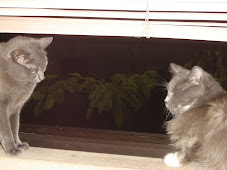
Evaluating sources should never be underestimated because it enables us to start working properly on what we have to write, whether a theses or an essay. If we manage to find sources that are interesting and worth reading, we’re starting off on the right foot. The problem is not only to judge material, but also to know what and where we have to search for. In order to write my theses one year ago, I did research in many libraries and I surfed the Net. I think that the Internet is more and more used by people in order to find helpful material because online sources are often updated regularly. Anyway, the Internet is an overwhelming context; it provides us with a lot of information and sometimes it can be very difficult to choose websites.
Now I'll tell you the steps I've always taken and the criteria I have used and I’ll still use in the future in order to find helpful online sources.
For my search I always use Google, but if I have to find blogs dealing with the topic I’m interested in I prefer using Technorati. Whereas Google concentrates on websites in general, Technorati is a search engine focused on blogs. Nowadays it’s indeed very common to find blogs that deal with specific subjects and are worth reading.
When I use Google or Technorati I always try writing different keywords in order to find what I want. When I finally find many websites which seem interesting, I try to evaluate them through my criteria.
For example, let’s talk about Google.
First, when I’m in front of a list of potential interesting sites, I read the title of the sites and the few lines where my keywords are included.
Second, I look at the url of the sites (I also learnt what the domains are and how to check them). If the urls are very long, it means they’re not homepages. If they have odd names I consider them unreliable.
Third, I click on the button ‘copia cache’ placed near the websites I’m still interested in. This function was created to enable people to visit the sites even when they're not available. I found it useful because it also highlights my keywords within the sites so my search becomes very easy.
When I visit the sites I always try to search for the author (if there isn’t the author I consider them not very reliable), to understand if it’s updated regularly (if it uses RSS feeds too), and to look at the layout. The websites should be well-organized. For example, they should be divided into sections, and they should contain useful links to the sections within the site. They should not have many banners or ads as well.
Then, I search again for the information contained in the websites. If it is a blog, I try to look at the amount of information (if it has only few posts, it’s not very helpful) and to read if there’s something worth considering. If the websites are interesting, the amount of the information is huge and can be found very easily, I consider the websites useful sources.
Here are the criteria I use to do research in libraries.
I concentrate on the author and I always try to get information about her/his previous writings. In order to do this, I have a quick look at the bibliography, and at the brief summary of the author’s life and career. This kind of information is usually available on books. Then I look at the index, which contains the contents of the book. The books are usually rated. Sometimes they can be highly rated by experts, and this can be useful to understand if the sources are reliable. The book shouls also be updated.
Now let’s consider criteria advised by three different websites: the
The tips given by the
This site provides me with a lot of interesting questions to ask myself and it deals with online sources and written sources. The site deals with many topics, such as authorship, goals, access. I think that it’s important to know who the author of a website or a book is. Anyway, the site advise people to ask themselves a lot of questions such as ‘What has the author written in the past about this topic?’ or ‘Did a teacher or librarian or some other person who is knowledgeable about the topic mention this person?’ As for online sources, I think that sometimes it’s difficult to find information about the author’s previous writings. Nowadays more and more people collaborate to create websites, and if they haven’t written something interesting before, this doesn’t mean that the website we’re judging is not trustworthy. I find that it’s useful to look if there’s a brief summary of the author’s life. As for written sources, we have always to search for the author’s previous writings. It is possible thanks to bibliographies and book lists, which are available in the libraries. If we still don’t know what the author has written, we can use a search engines to find material.
The OWL advises to check the aim of the website (or of the book) too. That’s is very useful! I appreciated especially the section about audience. The audience of a site/book is very important. If we know the target, we also know the aim of the site. As I mentioned among my criteria, the OWL wrote that it’s important to check the domain of the site as well. I didn’t know that ‘.com’ domain means that the site wants to sell or promote something! Great! I will take advantage of this suggestion!
I also appreciate what the OWL wrote about the accuracy of information, especially about rating. For example, if the site has been highly rated by a reputable rating group, the site can be considered reliable. True!
This site provides useful questions, like the other website I wrote about. I appreciate especially the question about plagiarism, which I didn’t mention among my criteria. Information can be often copied and pasted from site to site and we can’t know if it’s authentic. I didn’t think of how to contact the author. This is a helpful criterion. It can be useful to find an e-mail in order to interact with the author. I will profit from this suggestion!
These are the criteria I have used and I’ll use.
I hope you’ll find them interesting! Have a look at Easley Library-Bluefield College. I find it helpful.
Let me know!
Giovanna
(photo source)






7 commenti:
Hi Giovanna!
Once again your post is very thorough. You wrote an exhaustive overview on your personal experiences in searching and assesing Internet sources. More or less we use the same criteria. However, like you I also read the criteria on web pages Sarah suggested and I learned a lot! I should be considering many other things when evaluating! I agree with you that the information about the meaning of ceratain domains is very interesting! You also wrote that you search in Technorati and I think you are right when you say that nowadays blogs are getting more and more useful. I hadn't thought of searching in blogs before. I will try next time!
OK, have a nice Sunday! Bye bye!
Hi. Your post is very accurate.
I noticed that we all use the same criteria more or less, so our considerations about the reliability of the net are quite similar.
So I'm not going to annoy you repeating the same things.
What caught my attention is that you do research in Technorati (Eva noticed it too). I'm not used to searching for blogs. And you're right: blogs have become less personal and more reliable lately. Apart from personal pages or diaries, you find official blogs. Many of them are linked to related official websites, so that you can check the information.
See you,Federico.
Hi Giovanna!
As Eva and Fred said ur post is really complete, well done!
Searching for useful information is never easy..u can get lost and find something u can't rely on or even don't find anything interesting if u don't use good searching criteria..I've enjoyed reading the steps u follow when doing research, I think the idea of exchanging this advice with our peers is very good and constructive as we can learn a lot!
see u!
Hi Giovanna!
What you said is really complete: what can I add?!I noticed that we use more or less the same criteria for our researches. However, I what to thank you for the advice of "copia cache": I had never used it but I think that It can be very useful so you can see where your keyword on the site is! Moreover, before this course, I usually didn't search for blogs about the topic I was interested in; I used just google.
So, thank you very much!
Bye bye!!
Hi Giovanna,
you wrote on your long post a criterion, which I had never thought about: rates. Many websites offer the opportunity to rate their page and to leave a comment also, so that the next visitor will have an idea of how the previous judged it. However, I noticed that the pages which can be rated are usually not dealing with academic subjects for example. Organizations such like universities do not exploit such tool as valuable scale through which people can perceive the reliability or relevance of information. I believe that this is why rates are usually used by websites like Myspace.com, blogs or fan websites dedicated to artists and so on. Yes, of course rates might be important for this kind of pages! Otherwise it seems to me that this criterion is not always helpful to spot academic or information of this kind on the web.
Bye!
Hi guys!
Thank you for your nice comments. I read that many of you don't search for blogs. When I found out Technorati I understood that it can be a very useful tool. With this search engine you can find a lot of useful blogs, for example created by ESL teachers. Anyway, I always have to be careful because there are a lot of blogs which aren't helpful.
Dear Alice,
in the comment on your post I asked you a question about rating.
I've just read your comment on my post and I saw you wrote about this topic so you don't need to reply to my comment!
See you!
Giovanna
HI!
I'm replying to your question about whether I prefer Internet or Library: It depends on the sitation. If I need information quickly then the Web is more suitable. Library however is more reliable.
Posta un commento